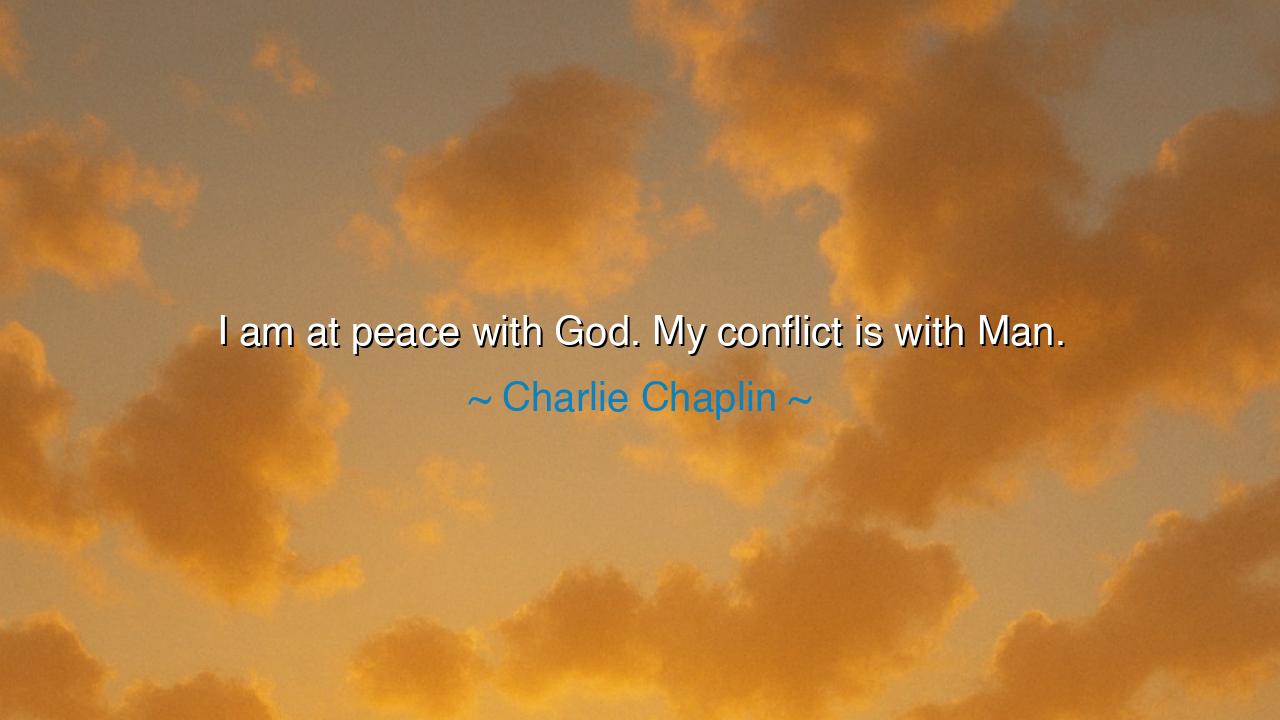
I am at peace with God. My conflict is with Man.






Hear the voice of Charlie Chaplin, the silent poet of the silver screen, who once said, “I am at peace with God. My conflict is with Man.” These words, though few, carry the weight of centuries—they are both lament and revelation, confession and defiance. Spoken by a man who made the world laugh while he himself carried sorrow in his heart, they unveil the eternal struggle of the soul that seeks goodness in a world that too often chooses cruelty. To be at peace with God is to be reconciled with truth, mercy, and love; but to live among men is to encounter injustice, pride, and ignorance. Thus spoke Chaplin, whose art reflected both the light of heaven and the shadow of human folly.
The origin of this quote lies in the life of Chaplin himself—a man born into poverty, who rose to become one of the most beloved figures in history. Through his silent films, he gave voice to the voiceless, portraying the Tramp, a humble wanderer with dignity intact amid humiliation. His laughter carried the ache of the oppressed; his tears spoke for the brokenhearted. Yet despite his compassion, he was misunderstood and condemned by many. Accused of subversion, exiled from the land that had made him a star, he came to see that his true quarrel was not with heaven, but with humanity’s capacity for hypocrisy. When he said these words, he was not renouncing mankind, but mourning it—a soul who loved deeply, wounded by the world’s failure to love in return.
In declaring himself at peace with God, Chaplin affirmed that his conscience was clear. He had sought truth through art, and compassion through laughter. He saw divinity not in dogma, but in humanity—in the poor child’s smile, the laborer’s sweat, the tear that falls unseen. To be at peace with God, for him, meant to live by the light of one’s moral purpose, to strive to heal rather than to harm. Yet, to be in conflict with Man meant recognizing that human society, blinded by greed and power, often mocks the very virtues that God Himself would honor. The artist who exposes falsehood is too often condemned by those who profit from it.
Consider the story of Jesus of Nazareth, whose path Chaplin’s words silently echo. He too was at peace with the Father, yet in conflict with the world. He preached love, and the world answered with a cross. So it is with all who stand for truth: their quarrel is never with heaven, but with men who twist heaven’s name for their own ends. Chaplin’s films, though clothed in humor, were sermons without pulpits. In Modern Times, he portrayed the dehumanization of workers; in The Great Dictator, he raised his voice against tyranny and hate. For daring to confront the arrogance of men, he was cast out—yet through his exile, his spirit found greater peace with the divine.
This quote, then, is not the cry of a cynic, but the prayer of a prophet. It is the acknowledgment that divine peace and human discord often dwell side by side in the heart of one who sees clearly. To be aligned with God’s truth is to be misaligned with a world built on lies. The man who seeks harmony with heaven must often walk in disharmony with society. Such conflict is not failure—it is the mark of fidelity. For as long as men choose cruelty over compassion, the just will be persecuted, and the peacemakers will be at war with the world.
Yet, within this struggle lies hope. Chaplin’s art was his answer to mankind’s cruelty. Instead of hatred, he offered laughter. Instead of bitterness, beauty. Through the simplicity of a silent gesture, he reminded humanity of its lost innocence. He proved that even in the midst of conflict with man, one may still live with peace in the soul. His films transcended borders and beliefs, speaking in the universal language of the heart. In doing so, he became a living bridge between heaven’s compassion and earth’s confusion—a jester who taught kings to weep and beggars to smile.
So, let this be the lesson passed down to every seeker of truth: Be at peace with God, even if you must be at odds with men. Do not fear the world’s disapproval when your heart follows what is right. The path of conscience may be lonely, but it leads to freedom. Live with integrity; speak with compassion; resist the temptation to mirror the cruelty of others. For when you are anchored in divine peace, no human storm can unmake you.
And thus, O listener of the ages, remember Chaplin’s wisdom: the true battle is not between heaven and earth, but within the heart of man. Seek peace with the Eternal, even if it sets you apart from the temporal. For to be at peace with God is to possess a stillness the world cannot steal—a light that burns, even when all other lamps go dark.






AAdministratorAdministrator
Welcome, honored guests. Please leave a comment, we will respond soon